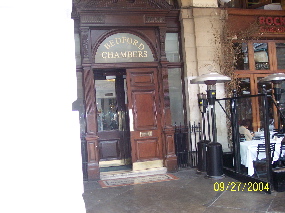Difference between revisions of "International Policy Network"
m (ff --> new format; reformat bottom section) |
m (ff fmt --> new format) |
||
| Line 1: | Line 1: | ||
<div | <div | ||
style="float:right;width: 300px;margin:0 0 1em 1em"> | style="float:right;width: 300px;margin:0 0 1em 1em"> | ||
| − | [[Image:IPN.jpg|300px|right|thumb|IPN offices, Bedford Chambers, in London's Covent Garden, next door to the Rock Garden]] </div>The International Policy Network (IPN) has its roots in a little-known charity called the [[Atlas Economic Research Foundation]], which is closely affiliated with the leading right-wing think tank the [[Institute of Economic Affairs]]. It is based in an office in Bedford Chambers in King Street, Covent Garden, London. | + | [[Image:IPN.jpg|300px|right|thumb|IPN offices, Bedford Chambers, in London's Covent Garden, next door to the Rock Garden]] </div>The International Policy Network (IPN) has its roots in a little-known charity called the [[Atlas Economic Research Foundation]], which is closely affiliated with the leading right-wing think tank the [[Institute of Economic Affairs]]. It is based in an office in Bedford Chambers in King Street, Covent Garden, London.<ref>[http://www.policynetwork.net/main/content.php?content_id=4 International Policy Network website], undated, accessed March 2006</ref> |
==History== | ==History== | ||
Revision as of 11:16, 19 August 2008
The International Policy Network (IPN) has its roots in a little-known charity called the Atlas Economic Research Foundation, which is closely affiliated with the leading right-wing think tank the Institute of Economic Affairs. It is based in an office in Bedford Chambers in King Street, Covent Garden, London.[1]
Contents
History
The International Institute for Economic Research was founded in 1971 by the late Antony Fisher, who also founded the Institute of Economic Affairs. Later it was known for many years as the Atlas Foundation UK Ltd before being renamed the International Policy Network (IPN) in 2001.
The IPN is part of Fisher's Atlas Economic Research Foundation, headquartered in Fairfax, Virginia. Atlas was established with the aim of bringing 'freedom to the world' by helping 'develop and strengthen a network of market-oriented think tanks that spans the globe.'
The IPN has addresses in London and Washington D.C. The Washington address is the same as that of the Competitive Enterprise Institute (CEI). Roger Bate who is an IPN Fellow, and a long-time associate of the IPN's Director Julian Morris, is an Adjunct Fellow of the CEI. Kendra Okonski who is the IPN's 'Project Director' in London was previously a CEI researcher.
In 2001 the name was changed to the IPN and it expanded its operations with significant corporate funding. Its international Directors then were Roger Bate and Julian Morris, two people who have spear-headed the pro-corporate, anti-environmental debate for over a decade in the UK, whilst supporting controversial industries. Bate co-founded the European Science and Environment Forum in 1994, which arose from the concept for a pro-biotech / tobacco, chemical industry front group in Europe funded by Philip Morris. He also solicited money of the tobacco industry for a book on risk and smoking, and Julian Morris was a witness for the GM industry Life Sciences Network at the GM Commission in New Zealand. Some unknown industry / industries are now funding ESEF / IPN to counter the environmental movement on a global scale.
Sustainable Development Network
Okonski and Morris appear to be the driving force behind another organisation, the Sustainable Development Network (SDN), while Morris and Bate connect to the Institute of Economic Affairs (IEA) and the European Science and Environment Forum (ESEF).
IPN's mission is to 'share ideas that free people'. It believes in de-regulation but that 'where regulations are necessary... they should be based on sound science and good economics.'
IPN works with a network of individuals and organizations around the world who share its beliefs. The IEA and the ESEF are both on the list of the IPN's 'partner organisations'. The CEI is not currently on the list, despite sharing its Washington address with the IPN.
In 2003 IPN and spiked-online co-sponsored a debate held at PR firm, Hill and Knowlton, on 'GM food: should labelling be mandatory?'. The seminar was introduced by Greg Conko of the CEI. Tony Gilland of the Institute of Ideas also spoke.
Former Dupont PR man Martin Livermore is said to be an IPN Fellow.
Front group
The IPN is becoming one of the most successful international right-wing corporate front organisations, whose very name deceives its origins and intent. It also funds and has set up the websites of certain "partner "organisations which have all the appearances of being African or Asian NGOs, but seem little more than satellite front organisations whose true identity is also hidden. In 2004 it received funding from Exxon to work on climate and a book was published by the IPN edited by Kendra Okonski. Okonski and Julian Morris still deny climate change and the need for any action. Writing last month Morris wrote "There are no solid grounds for assuming, as Messrs Blair and Howard do, that global warming demands immediate and far-reaching action".
Okonski is a long-time libertarian activist and daughter of a US lumber industrialist. Okonski has a history of counter-protests against progressive and environmental organisations. She organised the pro-farmers counter-protests at the WSSD. She also co-founded and managed the website counterprotest.net and organised the Washington-area 'Walk for Capitalism' in 2001. Okonski still remains the contact for the "Sustainable Development Network", another guise of the IPN. Okonski also has set up a number of websites of IPN's affiliates organisations that raises questions about their true independence. What you have here is a first world corporate front organisation setting up websites for so-called third world organisations, who then attack western environmentalists for being Imperialists. These include
- Institute of Public Policy Analysis - Nigeria
- Inter Region Economic Network (IREN) Kenya
- Liberty Institute - India
- The Alternate Solutions Institute, Pakistan.
Contact, References and Resources
Contact
Resources
References
- ↑ International Policy Network website, undated, accessed March 2006
